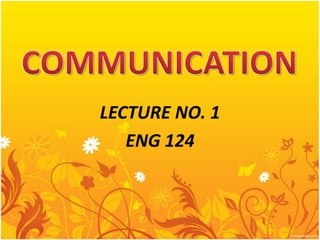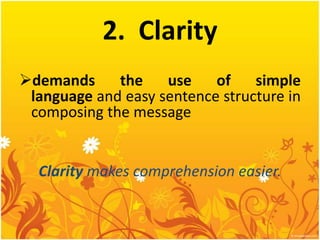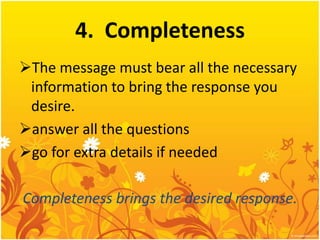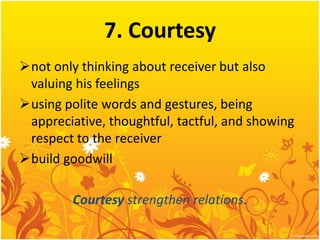Communication1
- 1. LECTURE NO. 1 ENG 124
- 2. Man is a social animal. He does not stand alone directly confronting the tumult of events around him. He cannot live without talking or engaging in conversations, whether in written or spoken mode.
- 3. COMMUNICATION • Late 14c , from Old French “comunicacion” • From Latin “communicationem” • From Latin “communicare” which means to share, to divide out , communicate, impart, inform, join, unite, participate in • From Latin “communis” which means common
- 7. Communication is… • The exchange of messages between and among human beings • Transfer of knowledge or information from one to another
- 9. Correctness Courtesy Clarity Concreteness Conciseness Consideration Completeness
- 10. 1. Correctness Use the right level of language Correct use of grammar, spelling and punctuation Accuracy in stating facts and figures Correctness in message helps in building confidence.
- 11. 2. Clarity demands the use of simple language and easy sentence structure in composing the message Clarity makes comprehension easier.
- 12. 3. Conciseness saves time of both the sender and the receiver can be achieved by avoiding wordy expressions and repetition Using brief and to the point sentences Conciseness saves time.
- 13. WORDY CONCISE Due to the fact that because In due course soon At this time now Few in number few On a weekly basis weekly In spite of the fact that although Until such time as until Meet together meet
- 14. 4. Completeness The message must bear all the necessary information to bring the response you desire. answer all the questions go for extra details if needed Completeness brings the desired response.
- 15. 5. Consideration demands to put oneself in the place of receiver while composing a message emphasizes positive pleasant facts, visualizing reader’s problems, desires, emotions and his response Consideration means understanding of human nature.
- 16. NEGATIVE TRANSFORMS INTO EMOTION/ EXPRESSION Anxious A little concerned Confused curious Destroyed Set back Stressed busy Lost searching
- 17. NEGATIVE TRANSFORMS INTO EMOTION/ EXPRESSION I hate I prefer Insulted misunderstood Painful uncomfortable Disgusted surprised Failure learning
- 18. GOOD WORD GREAT WORD Attractive gorgeous Fortunate blessed Smart gifted Curious fascinated Confident unstoppable
- 19. 6. Concreteness Being definite, vivid and specific rather than vague, obscure and general Putting action into the verbs Concreteness reinforces confidence.
- 20. 7. Courtesy not only thinking about receiver but also valuing his feelings using polite words and gestures, being appreciative, thoughtful, tactful, and showing respect to the receiver build goodwill Courtesy strengthen relations.
- 21. COMMUNICATION PSYCHOLOGY: Understanding human behavior through communication
- 22. “How can an English teacher understand his student through communication?”
- 23. Need to help others and be creative Need to be “somebody” Need to belong Safety and Security needs Basic Physical needs MASLOW’S HIERARCHY OF HUMAN NEEDS
- 24. Our needs determine our reaction.
- 25. Walk your talk.
- 26. Thank you!


























